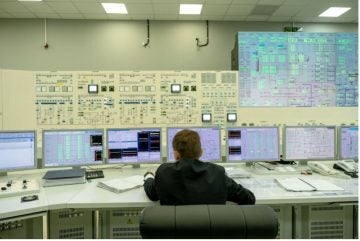
Scientists from the Scientific and Fuel Divisions of Rosatom successfully completed the “Maneuver-1” experiment, in which the parameters of nuclear fuel for VVER-1200 reactors were studied in daily manoeuvring mode (load following mode) of the reactor plant.
The tests were carried out in the MIR research reactor at the Research Institute of Atomic Reactors (NIIAR) in Dimitrovgrad under instruction from Rosatom’s fuel company TVEL. The aim was to study fuel elements of various designs in term of the fuel composition (with and without a burnable absorber integrated into the fuel). The tests in the research reactor provided a complete simulation of the operation of nuclear fuel in the daily power manoeuvring mode of a VVER-1200 power unit in an 18-month fuel cycle.
The results of the experiment will be used for additional verification of design codes and confirmation of the reliability of nuclear fuel in a daily schedule of load following. During the tests, the operation of the reactor was simulated in the load following mode, in which the thermal power of the reactor changes in the range from 100% to 40% of the nominal value. The power changes corresponded to the standard phases of daily electricity consumption in the power system: reduced load at night (seven hours of operation at 40% power), morning load (four hours at 100% power, reduced daytime load (four hours at 40% power), and evening load (nine hours at 100% power). Reactor tests continued for 224 days, during which 218 power reduction and increase cycles were completed.
Based on the results of reactor tests and post-reactor studies, the performance of the fuel was fully confirmed in the daily load following mode. Load following operation did not have a significant impact on its main characteristics (appearance, geometry, fuel temperature, gas pressure inside the fuel rod, corrosion state of the cladding, etc.). All tested fuel elements retained their tightness.
“The results of the study confirmed that nuclear fuel produced by Rosatom fully maintains its integrity and performance under conditions of multiple rapid changes in the linear power of the fuel rod,” said Senior Vice President for Scientific & Technical Activities at TVEL, Alexander Ugryumov. “This is another step towards justifying the operation of Russian high-power reactors in a load following mode. Our industry research on improving the efficiency of nuclear generation is attracting significant interest from foreign operators of Russian design nuclear power plants. In particular, for VVER-1200 reactors this is a justification for operation in load following mode; for VVER-1000 reactors this is a justification for operating a power unit at increased power up to 107% of the nominal power.”
In 2020-2022, at the VVER-1200 power units of the Novovoronezh and Leningrad NPPs, tests were carried out operating in load following mode at various power levels. Rosenergoatom Concern plans to carry out work to substantiate the possibility of introducing a daily regulation regime at VVER-1200 power units.






